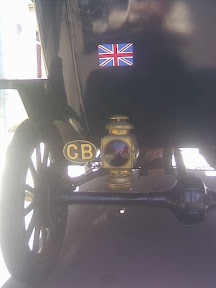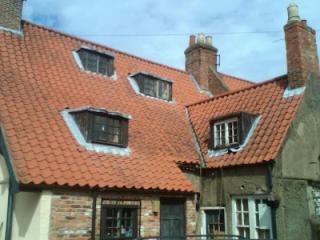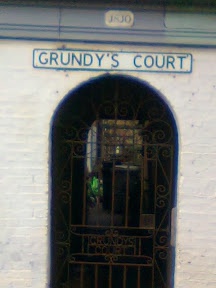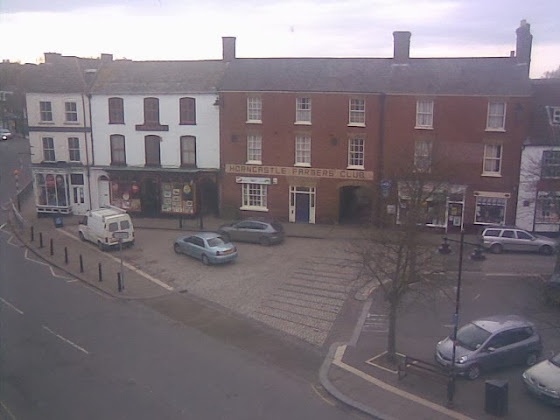|
One of the first things daytrippers and visitors notice are the Horncastle town signs and the numbers '1231'. This is thought to refer to the date of the market charter, but is invariably the time the traders start packing up after "being up since 5 a.m., mate" 
Roman Fort
 There was certainly something large here in Roman times, and arguments rage as to what it was, and what it was called. I think a little forensic history investigation is called for. If we take measure of, and extrapolate back the current buildings, rituals and placements, then it's obvious that with the concentration of current public toilets within the old roman walls, Horncastle started life as a toilet stop, on the Roman Way from Lincoln (Lin Colonia) to Burgh (Borough). No doubt the local ancient Britons sold wode, polished metal mirrors and bone combs to the legionnaires' wives, whilst noxious local plants were available to fill their pipes  (the trade carries on to this day). (the trade carries on to this day).
With the Emperor's chosen caravan being carried in Sedan chairs for 40miles, there's every reason to suppose the Saxon / Briton "Hyrnecaistre" was actually "Hernia Caesar". Ordnance survey maps show alot of suspiciously straight roads, and the older 1950's or pre-war maps have these lost antiquities and known historic trackways marked. Horncastle's Roman Walling can  be seen at the library. be seen at the library.
Revolution Just as in Iraq and Afghanistan, the Romans' demise left something of a power vacuum. In the centuries following, the Britons had running battles with Saxons. Supposedly Raengeires beat Horsa in the vicinity of Tetford, taking all his chatels. It's suspicious that Horses became very plentiful around this time, and an annual fayre began in the town, buying and selling..
And my heart is a handful of dust,
And the wheels go over my head,
And my bones are shaken with pain,
For into a shallow grave they are thrust,
Only a yard beneath the street,
And the hoofs of the horses beat, beat,
The hoofs of the horses beat...
Centuries later, divine retribution, with the reappearance of  Saxon, in the incarnation of adopted Horncastrian Peter 'Bif' Bifford. Saxon, in the incarnation of adopted Horncastrian Peter 'Bif' Bifford.
Almost simultaneously, the Vikings / Danes were encroaching southwards in search of treasure, food and fresh bloodstock, and it's fascinating to see how much magic of the North Atlantic refugees comes through in our  grammar, even today. The Vikings being remembered in Lincolnshire with a grammar, even today. The Vikings being remembered in Lincolnshire with a  140Mile Footpath from the Humber Bridge to Rutland. A 1000 years on and they were still fighting, first with the revolt against Henry Vlll, and then later the Battle for the Commonwealth at Winceby. It's thought the scythes in St Mary's church date from 1536 and are to do with these events. Actually, they were collected from the Tesco car park, the last time the Council cut the nettles...
The mini ice age, and later plague, touched the British Isles and took it's toll on the town population to some extent. 140Mile Footpath from the Humber Bridge to Rutland. A 1000 years on and they were still fighting, first with the revolt against Henry Vlll, and then later the Battle for the Commonwealth at Winceby. It's thought the scythes in St Mary's church date from 1536 and are to do with these events. Actually, they were collected from the Tesco car park, the last time the Council cut the nettles...
The mini ice age, and later plague, touched the British Isles and took it's toll on the town population to some extent.
 The last Horse Fair took place in 1948, and it's no coincidence Ford were bringing out enclosed, hardier cars just at this time. Part of the Great American Dream of World Domination with Standard Oil and Edison Electric - the only new car dealer in the town today is Mitsubishi. It was quickly found in the War years that the motor vehicle was the way to victory. As the fighting receeded to memory, Lincolnshire again became strategic, for the American Nuclear deterrant, the new
The last Horse Fair took place in 1948, and it's no coincidence Ford were bringing out enclosed, hardier cars just at this time. Part of the Great American Dream of World Domination with Standard Oil and Edison Electric - the only new car dealer in the town today is Mitsubishi. It was quickly found in the War years that the motor vehicle was the way to victory. As the fighting receeded to memory, Lincolnshire again became strategic, for the American Nuclear deterrant, the new  Hiroshima bombers based around the County. Perhaps Tennyson's 'Maud' foresaw them... Hiroshima bombers based around the County. Perhaps Tennyson's 'Maud' foresaw them...
As when it seem`d far better to be born
To labour and the mattock-harden`d hand,
Than nursed at ease and brought to understand
A sad astrology, the boundless plan
That makes you tyrants in your iron skies,
Innumerable, pitiless, passionless eyes,
Cold fires, yet with power to burn and brand
His nothingless into man.
Horncastle is supposedly 'twinned' with Bonnetable in the Sarthe region of France, allowing for a one line mention on their  'website'. 'website'.
Spooky goings on at the  St Mary's Church, with a change in vicar preceding a great flood. Hasn't it always been so since the time of Noah?! The floods in 1920 collapsed buildings on Bridge St, whilst in St Mary's Church, with a change in vicar preceding a great flood. Hasn't it always been so since the time of Noah?! The floods in 1920 collapsed buildings on Bridge St, whilst in  Autumn 1960 Horncastle broke the rainfall records with a foot and a half in three hours and water chest high at Robert Bell's wharf premises. Autumn 1960 Horncastle broke the rainfall records with a foot and a half in three hours and water chest high at Robert Bell's wharf premises.

Prominente The great and good are celebrated around the town with  Civic Blue Plaques, one of Horncastle's famous sons being Civic Blue Plaques, one of Horncastle's famous sons being  William Marwood, a cobbler. With the lawlessness of the times, he found he was making more money as a hangman, perfecting his trade with rope lengths calculated from the body mass of the convicted. Indeed Joseph Banks often only came into the town in his capacity as a magistrate to sit the assizes on High St, whilst Alfred Lord Tennyson's father in law, Henry Sellwood, was a solicitor. The courts at the top of North St were only built in 1865 because of the volume of cases at the time. All this probably gave rise to one of William Marwood, a cobbler. With the lawlessness of the times, he found he was making more money as a hangman, perfecting his trade with rope lengths calculated from the body mass of the convicted. Indeed Joseph Banks often only came into the town in his capacity as a magistrate to sit the assizes on High St, whilst Alfred Lord Tennyson's father in law, Henry Sellwood, was a solicitor. The courts at the top of North St were only built in 1865 because of the volume of cases at the time. All this probably gave rise to one of  Tennyson's lesser quoted quotes : "Of all horrors, a little country town seems to me to be the greatest". Born a Tennyson's lesser quoted quotes : "Of all horrors, a little country town seems to me to be the greatest". Born a  Leo on August 6th 1809, his father a Parish Parson and his mother a daughter of the Louth Vicar, Tennyson would have been as uncomfortable in the town as a friendly farm cat. His Jupiter around the Aries (Taurus cusp) shows his 'moral' to be forthright, while his Mercury in Cancer would have put a homely stricture on his thoughts. Venus with the Moon in Gemini would have given him a wistful faithfulness and humour and the opposition to the triple conjunction of Saturn, Leo on August 6th 1809, his father a Parish Parson and his mother a daughter of the Louth Vicar, Tennyson would have been as uncomfortable in the town as a friendly farm cat. His Jupiter around the Aries (Taurus cusp) shows his 'moral' to be forthright, while his Mercury in Cancer would have put a homely stricture on his thoughts. Venus with the Moon in Gemini would have given him a wistful faithfulness and humour and the opposition to the triple conjunction of Saturn,  Mars and Uranus making him bolder than most men in courtship, after a time. A triple conjunction of such volatile planets in Scorpio is cause for brilliance (or insanity) in many, and it is fortuitous that Neptune was close at hand. Mars and Uranus making him bolder than most men in courtship, after a time. A triple conjunction of such volatile planets in Scorpio is cause for brilliance (or insanity) in many, and it is fortuitous that Neptune was close at hand.
 Suppressed Poems Of Tennyson Suppressed Poems Of Tennyson

Pickpocket, or Two..
Tennyson's experience of visiting Victorian Horncastle, to court  the niece of Sir John Franklin (whom he would marry when he was 41), was at the time nearly 50 licensed pubs, bars, inns and premises were present in the town. With the largest Fayres in Europe for livestock, horses and implements, the town was full to overflowing with animals being sold. the niece of Sir John Franklin (whom he would marry when he was 41), was at the time nearly 50 licensed pubs, bars, inns and premises were present in the town. With the largest Fayres in Europe for livestock, horses and implements, the town was full to overflowing with animals being sold. 
It wasn't until around the mid Victorian era that someone thought to wash the streets twice a day, and gaslights became provisioned. With many drinking establishments having active links to 'madams' and their girls, thieves, pickpockets, counterfeiters, clippers and scoundrels, the law courts and local part time  Parish Constables were kept busy. The town has changed alot, the previous Walks, Arcades, Courts, Yards and Lanes being little warrens amongst stables, cock and dog fighting courts, alehouses and back street trades, where Gentlemen with a pocket watch would fear to tread without a Constable or Guard in attendance. Parish Constables were kept busy. The town has changed alot, the previous Walks, Arcades, Courts, Yards and Lanes being little warrens amongst stables, cock and dog fighting courts, alehouses and back street trades, where Gentlemen with a pocket watch would fear to tread without a Constable or Guard in attendance.
I am outlaw’d. I am none the worse for that.
I held for Richard, and I hated John.
I am a thief, ay, and a king of thieves.
Ay! but we rob the robber, wrong the wronger,
And what we wring from them we give the poor.
I am none the worse for that, and all the better..
Mutiny!
It's wry indeed to realise that most of the famous figures in the areas history (  Sir Joseph Banks, Revesby; Capt John Smith, Willoughby; George Bass of Sleaford; Sir John Franklin, Spilsby; and his uncle, Capt Matthew Flinders, Donington) became famous after putting tens of thousands of miles between themselves and Horncastle. Their families boosted by agricultural riches and the draining of the fens, men of academic learning and more leisurely pursuits could be supported by the economy. Sir Joseph Banks, Revesby; Capt John Smith, Willoughby; George Bass of Sleaford; Sir John Franklin, Spilsby; and his uncle, Capt Matthew Flinders, Donington) became famous after putting tens of thousands of miles between themselves and Horncastle. Their families boosted by agricultural riches and the draining of the fens, men of academic learning and more leisurely pursuits could be supported by the economy.
The definitive  Horncastle History is available to read online, but, as usual it's written by and for those who were doing well, whilst Marwood and Flinders were arranging death or transportation for those who were finding hard times. Horncastle History is available to read online, but, as usual it's written by and for those who were doing well, whilst Marwood and Flinders were arranging death or transportation for those who were finding hard times.
A history of  Claxby Village, near Market Rasen, shows the criminalisation of thousands at the time for minor transgressions; such were the orders to magistrates to enable a slave labour pool in the 'brave' New World.
Had they stuck around, they would have seen a burgeoning wealth for the town as the canal, and the railway, turned Horncastle into the Immingham of the time. With large ships still anchoring off Skegness, Wainfleet and up the Witham from Boston, the small Horncastle sloops and canal boats did a roaring trade. Claxby Village, near Market Rasen, shows the criminalisation of thousands at the time for minor transgressions; such were the orders to magistrates to enable a slave labour pool in the 'brave' New World.
Had they stuck around, they would have seen a burgeoning wealth for the town as the canal, and the railway, turned Horncastle into the Immingham of the time. With large ships still anchoring off Skegness, Wainfleet and up the Witham from Boston, the small Horncastle sloops and canal boats did a roaring trade.
Little breezes dusk and shiver thro' the wave that runs for ever,
By the island in the river, flowing down to Camelot.
Four gray walls, and four gray towers overlook a space of flowers,
And the silent isle imbowers The Lady of Shalott.
By the margin, willow veil'd, Slide the heavy barges trail'd
By slow horses; and unhail'd the shallop flitteth silken-sail'd
Skimming down to Camelot
Buildings of the town became three, four and five storey, on top of extensive cellars, echoing the Baltic Hanseatic Burghers across the North Sea. One of these belonged to Lunn & Dodson and can still be seen to the West of the town from the Bain on Bridge St.,Sir Henry Lunn making his fortune with travel away from Horncastle, setting up Lunn Poly, now Thomson Holidays.

As the railways lost traffic, the roads expanded and the cobbles were given a coating of tar from Mr.MacAdam. The thatched roof all but disappeared, the area becoming urbanised, brick and tile instead of straw and cobble. With Horncastle supplying much of the Wold with farming equipment and stores, things were still looking rosy, but this perverse change to road transport in the 1950's ushered in leaner times killing the railway in the end, which had earlier usurped the canal. Mass production and centralisation meant wholesalers became a trade of the past, and warehousing and stockyards further succumbed to 'just-in-time' production. This shifted the emphasis to sea-ports and container lorries.
The pace of life changed somewhat and became much more frantic and crucial for those involved in work and the supply chain. What two hundred years ago was leisurely shipped, or one hundred years ago steam trained to town wharfs, now must be driven individually around the county at 70mph, from large central depots. 
|